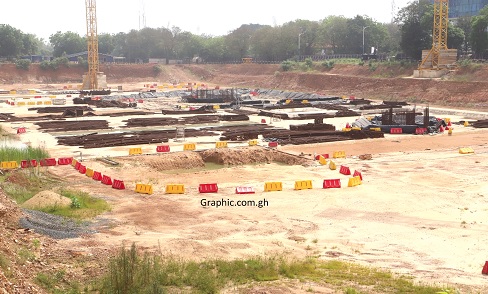I was recently in Accra for 10 days, lodging in a hotel in North Ridge.
Driving around town, I frequently passed the site of the putative national cathedral.
As readers will recall, the project was announced 91 months ago, in March 2018, by the then president, Nana Addo Dankwa Akufo-Addo, in fulfilment of his personal promise to God on winning the December 2016 presidential election.
Located near Independence Square, the Osu Cemetery and the Accra Sports Stadium, the national cathedral site is vast, around 14.5 acres.
Although the site is boarded up, you can still discern the – now fading – posters adorning the walls, replete with artist’s impressions of the completed national cathedral.
Audit
Following an audit of the national cathedral secretariat’s operations over 2021-23, completed in May 2025 by Deloitte and Touche, President John Dramani Mahama dissolved the secretariat in July.
The audit uncovered a litany of financial irregularities, procurement breaches, and a ‘general lack of due process’.
The now-abandoned national cathedral is a political battleground and national embarrassment.
Around $100 million was spent on the project without discernible result, beyond a gigantic hole in the ground, a prime breeding ground for mosquitoes.
The national cathedral was the then president’s personal project, and many Ghanaians were not happy about state money being ploughed into its construction.
Additional funds were to be raised by Ghana’s Christian community, as well as from Ghanaians, both home and abroad, who wanted to make a personal donation towards construction costs.
By the time of the project’s cancellation, these costs had spiralled to an estimated $400-450 million.
Convention Centre
What is the 14.5 acres of prime land in central Accra now going to be used for? According to recent reports, President Mahama’s administration is planning to convert the site into a ‘National Convention Centre’.
It would include a ‘state-of-the-art’ multipurpose amphitheatre, ‘exhibition pavilions’, the ‘Ghana Mall’, and a ‘creative economy hub’.
No details of its projected cost have been made public, nor any information about how it would be paid for.
What would Ghanaians prefer to see on the 14.5 acres of central Accra earmarked for the now-abandoned national cathedral?
While the public has not (yet) been asked, it is clear that there is scant desire for a Christianity-focused national cathedral; during the years of the national cathedral’s slow demise, critiques expressed in the media, including social media, made this view abundantly clear.
Many questioned its desirability at a time of economic strictures and high inflation, as well as a lack of money for vital social programmes.
The ‘National Convention Centre’ is projected as part of the government’s ‘24-hour economy’ policy, intended to promote Ghana’s arts, culture, sports, and tourism and attract significant foreign and local investment.
At the moment, with a lack of public consultation, the ‘National Convention Centre’ is not mired in financial scandal nor vilified by public opinion.
Nevertheless, a November 2018 comment in the Financial Times, by Yaw Nsarkoh, vice-president of Unilever for Ghana and Nigeria, is of continued relevance: ‘[a]t a time when taxes are going up, banks have collapsed and you can’t pay for social programmes, is it really the thing to do to build?’ a costly ‘National Convention Centre’ with a large sum of state money?
Advocates might claim that a ‘National Convention Centre’ is timely, amplifying Accra’s emerging position as an international city attracting increasing numbers of foreign tourists, and highlighting that the city is a ‘happening place’ where foreign money could be lucratively invested.
Critics, however, might ask the same question as was posed in relation to the national cathedral: Who would pay for the construction and running costs of a ‘National Convention Centre’?
The answer might be a mix of state and private money, with the latter necessarily attracted by sweeteners to encourage investment.
Public debate
Before any decision is made about the former national cathedral site, it is imperative that the government conducts a public debate about what is best for Ghana and, crucially, how any future project on the erstwhile national cathedral site would be financed, in relation both to initial construction and longer-term running costs.
It might be said that the last thing the country needs is another eight plus years of inactivity, questionable financial practices, bitter controversy and, ultimately, nothing to show for it but rancour and regret.
Here’s my suggestion: Let’s assume the National Convention Centre is projected to cost $400-450 million, the same as the national cathedral, with half the money coming from Ghanaians’ taxes.
What could $200 million buy today in Ghana?
A budget of $200 million would pay for between 3,000-5,000 rural primary schools, or 500-650 kilometres of high-quality paved roads, or 30-40 district hospitals including equipment and logistics.
Spending the money on social development projects would have a discernible impact, benefitting not just Accra but areas of the country far away from the capital.
Ghanaians are crying out for more development.
The last government was charged with not doing enough in this regard.
The $200 million or so that the state would necessarily invest in a ‘National Convention Centre’ would be much better spent on desperately needed social development projects.
The danger of investing more money in Accra is that more and more people would be drawn to the city to try to make their fortunes and rural areas would continue to decline.
The writer is Emeritus Professor of Politics at the London Metropolitan University, UK.

